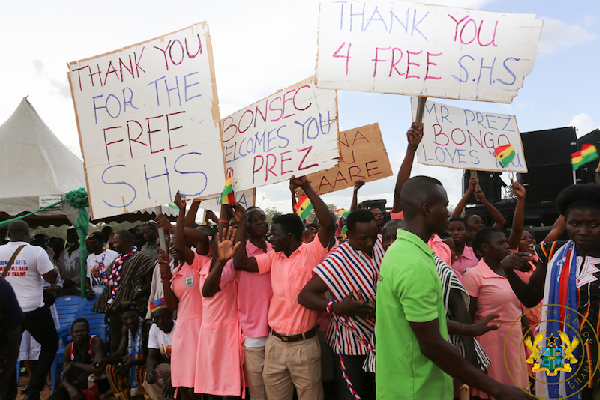
IMF support: Free SHS worth saving
Against the backdrop of current fi scal challenges and the decision of the government to seek an International Monetary Fund (IMF) bailout, one of the many questions being asked is what happens to government fl agship programmes such as Free Senior High School (Free SHS).
Several ideas have emerged, but the one I am particularly interested in is a modifi ed Free SHS programme where the ability to pay determines who qualifi es and how much fi nancial support they receive from government.
Advertisement
Free SHS
On such sensitive policy matters, one cannot ignore prevailing public opinion. What does public opinion say about targeting Free SHS? As I always do, I turn to the Afrobarometer Survey. In Round 8 (2019), Ghanaians were asked about their agreement or otherwise with the following statement –“In implementing the Free SHS policy, the government should have targeted only the poor who otherwise will not be able to pay for secondary education.”
Opinions were very closely divided– 48 per cent agreed while 46 per cent disagreed. The remaining were either neutral while one per cent said they did not know. Ghanaians were further divided along different demographic lines. Among those living in the rural areas, the split was 48 per cent agree to 44 per cent disagree.
In the urban areas, it was 48 per cent disagree to 47 per cent agree. In the coastal development belt, it was 48 per cent disagree to 45 per cent agree. In the northern development belt, it was 57 per cent agree to 31 per cent disagree. In the middle belt it was 50 per cent agree to 47 per cent disagree. Among men, 48 per cent agreed, 47 per cent disagreed. Among women, 48 per cent agreed, 45 per cent disagreed. Households with one to three children, 50 per cent disagreed, while 56 per cent of households with four or more children agreed.
Ghanaians with no lived poverty disagreed (54 per cent), the rest agreed – low-lived poverty (48 per cent), moderate-lived poverty (52 per cent) and high-lived poverty (59 per cent). Across the 16 regions, responses varied as well. In Western, Western North, Ashanti, Central, Volta and Northern, agreement ranged between 35 per cent and 49 per cent.
In Greater Accra, Oti, Eastern, Savannah, Bono and Ahafo, agreement ranged between 51 per cent and 59 per cent. In Upper West, 62 per cent agreed. In Upper East, 63 per cent agreed. Across the partisan divide of our two main political parties, NPP partisans were split: 42 per cent agreed, 53 per cent disagreed. Among NDC partisans, 37 per cent agreed, 55 per cent disagreed. I concede that three years later, opinions may likely have changed. However, the illustrative point here is that support for the targeting of Free SHS varies considerably.
Social intervention The Free SHS is a social intervention programme worth saving. Going back the same Afrobarometer survey from 2019, a strong majority of Ghanaians (87 per cent) asserted that the Free SHS policy had created an opportunity for many who otherwise would not have been able to pay for secondary education. This for me is a strong indication that Ghanaians are in full support of the programme. So, what will happen to Free SHS under an IMF programme? Social interventions are policy choices and policy choices can always be undone.
It is, however, diffi cult to undo choices that enjoy strong popular support. There are also punitive political consequences that come with undoing certain social interventions. But the government, in the current crisis it faces, may have no choice but to seriously consider a modifi cation to the programme.
Is targeting, or as we say in public policy means testing, the solution? I have often argued that means testing works if two conditions can be met. First, citizens must report their income truthfully, and second, the government must have the capacity to verify the truthfulness of the income reported. If these two conditions can be satisfi ed, then targeting will work and the government will be able to determine who has the ability to pay and who does not. Absent that, it becomes extremely challenging to ascertain with accuracy, a family’s ability to pay. For example, I read a suggestion that Category A schools must be exempted, but that falsely assumes these schools are populated by those who can pay.
The idea of cost sharing was advanced by the Institute of Economic Affairs (IEA) several weeks ago. It will still have to confront the two conditions described above because a family’s share of the cost will have to be dependent on how much they can pay. The government assures, in the frequently asked questions published by the Ministry of Finance in Point 19, that the programme will not be suspended.
It, however, concedes that all programmes will undergo review for “optimisation and effi ciency”. The policy objective of the Free SHS programme is noble – expanding access to senior secondary education by removing cost barriers. In the process of review, whichever way the programme is modifi ed, if it comes to that, the policy objective must not be lost.




